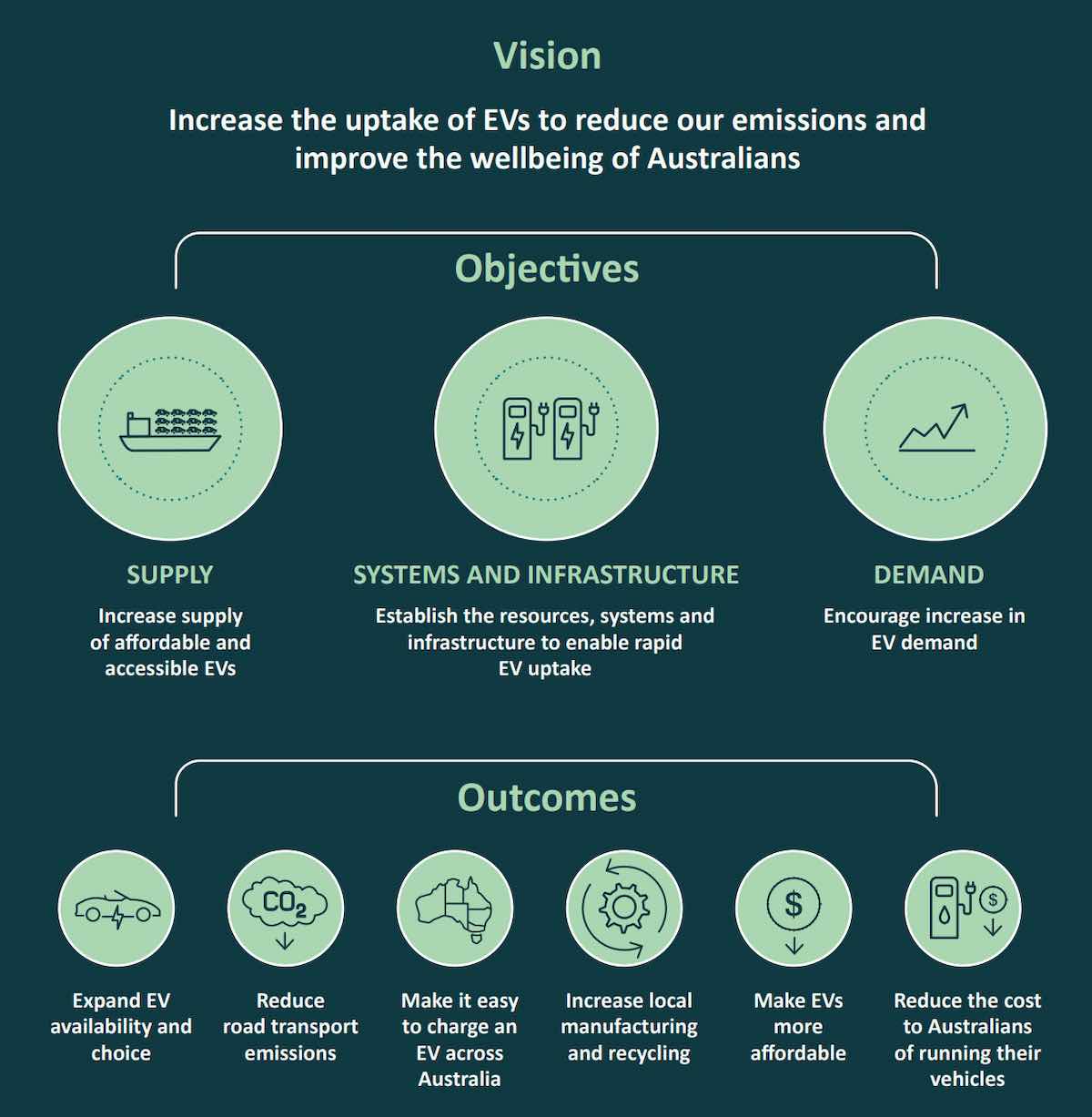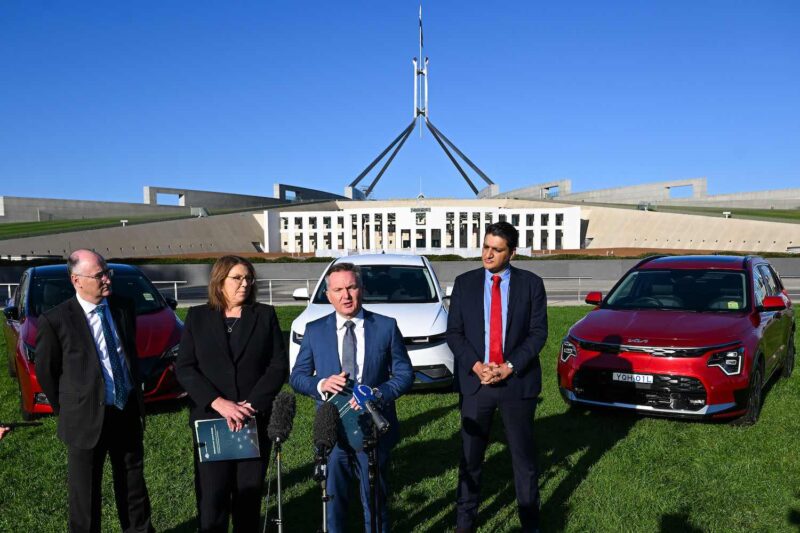The Australian government has finally released its long awaited National Electric Vehicle Strategy, committing to the introduction of fuel efficiency standards, but delaying them until further consultations with the car industry.
The minister for climate change and energy Chris Bowen and the minister for Transport Catherine King made the announcement on the Parliament house lawn on Wednesday, describing it as a “turning point” for the EV market.
Australia has been under pressure to introduce fuel efficiency standards, being one of the few countries in the western world not to have one. Bowen noted its absence is stalling the supply of EVs and costing fossil car owners more than $500 a year in extra fuel costs. Many analysts say Australia has become a dumping ground for inefficient cars.
“This strategy offers an historic opportunity to develop fuel efficiency standards that learn from international best practice, while recognising the unique needs of Australians,” King said in a statement.
“It will send a strong message to the global car industry that when it comes to transport technology, Australia will no longer settle for less.
“More than 85 percent of all cars sold in the world are subject to fuel efficiency standards. It’s time Australians were offered the same choice.”
Fuel efficiency standards outline how much pollution – or specifically, carbon dioxide – a car will produce when it’s running. But many EV advocated say they are frustrated by the new delays and extended consultation. See: EV advocates frustrated as vehicle emissions can kicked down the road again
National Electric Vehicle Strategy covers supply, infrastructure and demand
The government’s National Electric Vehicle Strategy (NEVS) brings together policies aimed at increasing supply of EVs, establishing systems and infrastructure to support EVs as well as increasing demand for EVs.

The NEVs introduces two new initiatives on the supply side which are the development a Fuel Efficiency Standard and a policy preparing for a recycling, reuse of EV and other large format batteries.
The new supply side initiatives join existing state and territory EV fleet targets, incentives, and commitments like the Queensland government’s target for 50% of new passenger vehicle sales to be zero emissions by 2030 and 100% by 2036.
Existing supply side commitments also include Net Zero Australian Public Service by 2030, (75% low emissions vehicles for Commonwealth fleet new passenger vehicle purchases and leases by 2025) and The Australian Made Battery Plan, National Reconstruction Fund, and Critical Minerals Strategy
In Systems and Infrastructure the NEVS has three new initiatives:
- Developing a national mapping tool to support optimal investment in – and deployment of – EV charging infrastructure.
- Tools and guidance to enable EV uptake for residents of existing multi-residential buildings.
- Funding to support world-leading EV guidance, demonstrations, and training for emergency service workers
Of all the new initiatives the Fuel Efficiency Standard has the potential to have the biggest impact on accelerating the transition away from polluting petrol and diesel cars.
Government going out for consultation yet again
Despite the US government last week tightening its vehicle emissions standards that were originally introduced in 1970s, today’s announcement doesn’t change anything in the short term. We already know what good fuel efficiency standards look like and we know they’re working well in the European Union and in countries like New Zealand.
Commenting on the US government’s introduction of strong vehicle emissions standards last week, Electric Vehicle Council chief executive Behyad Jafari was critical of the government’s drawn out process.
“The US first introduced fuel efficiency standards into law in the 1970s and has been strengthening them since then. In 2023, Australia has a discussion paper about them. It’s ridiculous,” said Jafari.
After months of consultation on the National Electric Vehicle Strategy, the government is now going out for another public consultation specifically on fuel efficiency standards which simply buys more time for legacy auto companies to continue selling highly polluting vehicles in Australia.
Groups welcome commitment but are frustrated with yet more delays
“Because Australia doesn’t have fuel efficiency standards, we have become a dumping ground for expensive, polluting, petrol-guzzling vehicles. This is forcing too many Australians to keep forking out for cars that hurt household budgets, our health, and our environment,” said Climate Council head of advocacy Dr Jennifer Rayner.
“Strong fuel efficiency standards are the key to unlocking supply of the cleanest and cheapest-to-run cars for Australia – including electric ones. The government and industry will be driving with a flat tyre in trying to deliver the rest of the National Electric Vehicle Strategy if we don’t get these in place soon.”
The Climate Council is calling for fuel efficiency standards that:
- Set Australia on a strong pathway to a zero emissions fleet – with a target of all new vehicles sold being zero emissions by 2035 at the latest
- Align with other car markets like New Zealand, the United States and Europe as a minimum – so Australia moves up the queue for cleaner, cheaper vehicles
- Deliver genuine reductions in emissions from new cars sold in Australia – avoiding credits and loopholes that undermine their effectiveness
- Are mandatory and legislated – auto manufacturers shouldn’t be able to opt out
- Start as soon as possible – every new vehicle sold today will likely be on the road for at least the next 10 years, so we cannot delay.
“The Federal Government needs to put the pedal to the metal in delivering strong fuel efficiency standards. There are around a million new cars sold in Australia each year so we need to act fast to give drivers more choice and see them start saving.” Dr Rayner said.
Solar Citizens , a group which has been advocating for fuel efficiency standards as part of their Electric Ute Roadshow campaign, said new emissions standards must be strong and free of loopholes that allow car makers to continue selling polluting vehicles.
“What we’ve needed for a long time is a world-class Standard that is at least as ambitious as Europe or New Zealand, without loopholes or dodgy super credits that create perverse climate outcomes, and that give all Australians a fair go and reduce spending on petrol,” said Solar Citizens clean transport campaigner Ajaya Haikerwal.
“It’s an easy rule change with a minimal cost to the Government.”
Solar Citizens analysis has shown that if the Federal Government implemented a Fuel Efficiency Standard matching the European Union, Australians could save at least $11 billion in fuel cost savings over 5 years, including $4 billion for regional Australia.
Government needs to push back on motoring lobbyists when designing policy
Greenpeace Australia Pacific also said the new standard must be robust.
“Car industry lobbyists, the Federal Chamber of Automotive Industries (FCAI), were recently exposed as having a secret emissions plan that would slow EV uptake,” said Greenpeace Australia Pacific senior campaigner Lindsay Soutar.
“In the absence of up-to-date fuel efficiency standards, Australia’s domestic vehicle fleet is one of the most polluting and least efficient in the world.
“For too long Australian households have been missing out on the benefits of cleaner more efficient vehicles: cost savings, cleaner quieter streets, healthier communities, and reduced reliance on foreign oil.”
Public submissions to Australia’s Fuel Efficiency Standard can be made here. Submissions can be made until May 31.

Daniel Bleakley is a clean technology researcher and advocate with a background in engineering and business. He has a strong interest in electric vehicles, renewable energy, manufacturing and public policy.

